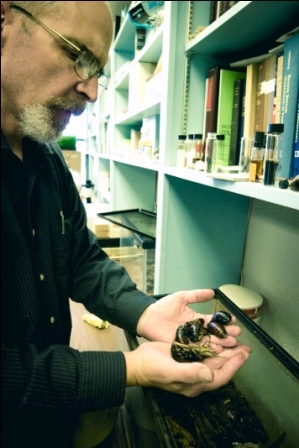By Maurissa Munoz
Photo by Geo Lujan
Darren Pollock’s office is crawling with small creatures.
Pollock, a biology professor at Eastern New Mexico University, is an entomologist, a studier of insects. He has been at ENMU since the fall of 2001. Pollock teaches courses in invertebrate zoology.
 All kinds of invertebrates can be found in Pollock’s office. There are hissing cockroaches, giant desert millipedes, stick bugs, black widow spiders, scorpions, praying mantises, and a vinegaroon, along with many others.
All kinds of invertebrates can be found in Pollock’s office. There are hissing cockroaches, giant desert millipedes, stick bugs, black widow spiders, scorpions, praying mantises, and a vinegaroon, along with many others.
Pollock said that his interest in studying insects began when he was a child.
“Others ran from bugs, I ran to bugs,” he said.
Pollock completed his schooling in Canada. He first was interested in studying pre-medicine, but he soon after changed his degree to entomology, which he enjoyed studying much more.
Pollock’s research focus is on beetles. He researches beetles with origins ranging Japan and the Philippines to Costa Rica.
He currently is doing research on 11 new species of beetles. He is working to identify whether or not the new species belong to the same genus.
Pollock works on trying to classify various types of beetles. One way he attempts to classify beetles is to look at the male genitalia of the beetles at the microscopic level.
Pollock’s research is unique to other coleopterists, or beetle studiers, because he studies the larvae of a beetle. He has had articles published in the coleopterist Bulletin and has written various book chapters.
His interest in doing research on beetles came from a professor he encountered during a summer job he had during his undergraduate studies. This professor was a coleopterist and encouraged Pollock to study beetles.
Pollock said there are not as many coleopterists in academia as needed. There are 130 families of beetles, some of which have not been looked at for over 100 years.
“The number of beetles demanding attention is more than the number of people giving the attention,” he said.
